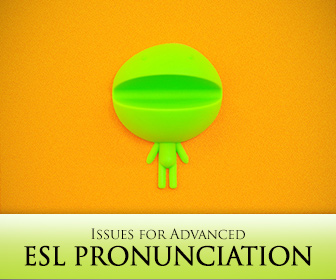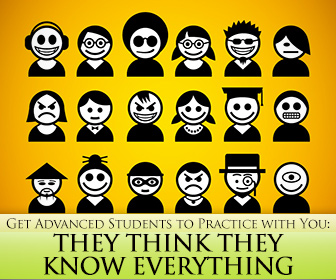Almost There, Continued Refinement: Issues for Advanced ESL Pronunciation


Also, they have enough language in their toolkit that they circumvent English concepts that are tricky for them. They obviously know they do not speak perfectly because they have contracted you, a native or more skilled speaker, to help them with their trouble spots and fix the nuances that will make their grammar better, their syntax sharper, and their pronunciation spotless. It can be hard though, to get non-native speakers to really practice what they need to practice! Here are some strategies that might help.

It is important, with non-native speakers, and especially if they have hired you to practice one-on-one, to put yourself on their level. If you appear better or smarter than your student, you will intimidate her and dissuade her from practicing trouble spots. You need to create an open, friendly environment where mistakes are made, and one of the best ways to do this is to make mistakes yourself or talk yourself down! Two applications:
If you are practicing conversation, only ask your students questions. Design the questions so they have to practice their trouble spots. They will struggle to use the troubling phrases/words because they will want to tell you all about themselves. This is human nature. If you are practicing grammar, give them writing assignments that focus on their past experiences and future desires.
Students that have managed to get this far in a foreign language and want to practice further are most likely over achievers. They prefer to be the leaders, the ones teaching you. Create problem activities where they have to explain something to you using trouble language or difficult grammar.
Do not call the class “Advanced Grammar and Pronunciation”. Call the class something like “Technical Aspects of Conversation for English Experts”, or, “Lose Your Accent in 2 Months”. These titles will appeal more to students that are advanced but not on a perfect fluency level yet and help encourage participation. They probably have already taken “advanced” English and want to think they are learning something new or value-added.
These students are usually really busy. They probably have jobs and families, are young over achievers, or are more than full time students. Make sure to have class not just when they can squeeze it in, but at a time when they will be alert, open, and unoccupied.
Some teachers like boundaries and do not want to be friends and peers with students. Skip this strategy if you are one of those! If you are uncomfortable, it does not work. Consider though that advanced students probably do not need discipline and boundaries. They will benefit more from a release of those boundaries. Try to look at them not as students, but as people like yourself that want to perfect a language. They will feel more comfortable with you and worry less about making the mistakes that they need to make in order to get their language to the next level!
Aim to be just a little bit personal if this is uncomfortable, and you might be amazed how much further you can take your students!
They can also be frustrating though and difficult to teach and get to the next level of English mastery. Try applying a few of these strategies if you are having a hard time!